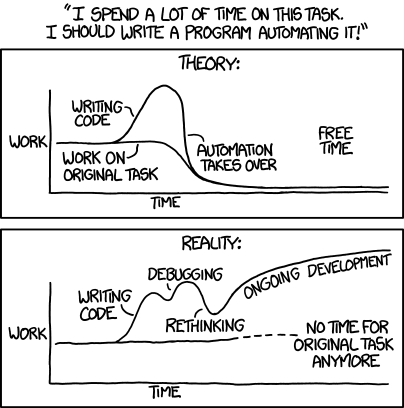
Staff are worth it!
How would you explain the implementation of Robotic Process Automation to staff in an office, well to para phrase L’Oreal – “Because you’re worth it”.
Some employees are fearful that the introduction of Software Robots will mean job losses but despite the articles in the media suggesting this, the reality is that jobs change and staff are able to contribute more to the business.
Any employer will tell you that staff are valuable asset. The introduction of RPA is because staff are worth it.
The office environment is totally people driven. Getting the best from people cannot be trying to get them to work like Robots doing mundane repetitive tasks.
For many years, businesses have introduced computer systems and trained staff to operate them. Clearly there are benefits from using computer applications, nobody today would consider creating a business that used pen and paper to run the operations. The reality is that for most businesses many computer applications are involved – Email, CRM, Finance, ERP, etc. Although there is the theoretical idea of everything being fully integrated, the solution is actually people doing work moving data particularly with email.
The introduction of “Robotic Process Automation” (RPA) changes the tasks performed by the people in the office. The “Robots” used by RPA, automate the repetitive tasks people undertake on computer applications. Like other automation, RPA delivers consistent processing of the activities it performs removing the human errors that inevitably occur when people perform a process. As RPA enables the “Robot to be taken out of the Human” activity, it enables people to utilise their human skills for conversation, judgement, etc.
Many offices are operated on a “Business Hours” basis, so there is a lot of unused capacity on the PCs and laptops used by office staff. When RPA is used to perform tasks that can be undertaken in an “Un-attended” mode without any interaction from people, this spare capacity has the potential to be used. RPA robots can be executing 24 hours a day, seven days a week if there is work available for them to do. By exploiting this capability, the repetitive tasks performed by people in a business process cannot only be performed by robots but can potentially be performed at a different time. Scenarios will differ widely, but completing work in a shorter timescale offers the potential to have much bigger impact through competitive advantage although of course automation of one aspect of automating a process is that it can highlight or create a “Bottleneck” in a different part of the process.
Recruiting, training and retaining staff takes a lot of effort. They are valuable to the business, so why would any intelligent manager expect to ask staff to perform “Mundane” / “Boring” activity on computer systems?
Freeing staff from performing such repetitive tasks should be an objective for any manager. The risks to staff in terms of their mental health and physical well being should be justification to introduce RPA, the fact that it improves productivity and quality make the decision a “No Brainer” in most circumstances.
Of course there is a cost with implementing and operating software robots but compared to the real costs of expecting staff to do the work, there is no reason not to change.
I wonder how long it will be before an employee brings a case against an employer for “NOT” having implemented RPA?
I expect many HR staff and consultants are looking at policies and procedures to consider the impact of RPA today and no doubt AI in the coming months. It would be hard to imagine HR departments saying “People are not worth it”.
For more on RPA, please see RPA – Robotic Process Automation















